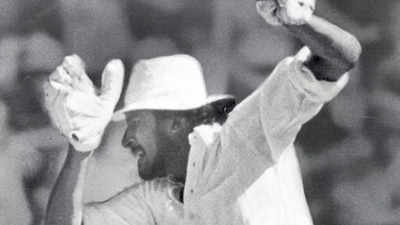
MUMBAI: The picturesque Adelaide Oval, the venue for the second Test from Dec 6, holds plenty of special memories for fans. When India first toured Australia in Jan 1948, Vijay Hazare scored a century in each innings (116 and 145) against ‘Bradman’s Invincibles.’
In Dec 2003, Rahul Dravid scored a double century (233) and 72 not out and Ajit Agarkar took 6/41 in India’s historic four-wicket win. Almost 43 years ago – Jan 1981 — Sandeep Patil delivered a knock for the ages at the ‘City of Churches.’
Known for its long straight boundaries, short square boundaries and reputation as Australia’s best batting wicket, the Adelaide Oval provided the stage for Patil’s unforgettable innings.
Powered by Kim Hughes’ 213 and 125 from Graeme Wood, Australia amassed a formidable 528 runs. In response, India was in trouble at 130/4 before Patil led a spirited fightback. Patil delivered a counter-attacking 174 off 240 balls, laced with 22 fours and a six. Taking on a fearsome Australian pace attack featuring Dennis Lillee, Len Pascoe, and Rodney Hogg, Patil’s knock became the highest individual score by an Indian batsman at Adelaide — until Dravid’s 233 years later.
Patil added 108 for the fifth wicket with Chetan Chauhan, who scored 97 and then, 147 for the sixth wicket with Yashpal Sharma (47). India went on to make 419, and his knock helped India wrest a famous draw. The brilliance of Patil’s innings lay within a context. He was coming into Adelaide after sustaining a serious injury to his head in the first Test at Sydney. Batting without a helmet, Patil reached 65 had on the first day when, just before the tea break, he was struck on the throat by a Hogg delivery.
Undeterred, he refused to call for a helmet, only to be hit over the right ear by a bouncer from Pascoe in the first over after tea. Patil collapsed unconscious at the crease and had to retire hurt. He was stretchered off the field and taken straight to hospital. Though injured, he returned to bat in second innings at the insistence of his captain Sunil Gavaskar since India needed to avoid an innings defeat. Shaken after that incident, the bowler Pascoe played only three more Tests and retired at the age of 32.

“It was sweet of him to come to the hospital, before day’s play, to see me,” Patil recalled while talking to TOI.
“Importantly, after that day, he never bowled a bouncer to anyone. I only met him once later at Malaysia Sixes where we exchanged a brief ‘Hello’.”
The Patil hits had a long-reaching impact. He and his batting colleagues realised they needed helmets — an almost alien concept to the Indian batsmen till then. It must be remembered here that there was no limit on the number of bouncers allowed in an over.
“After I got hit in Sydney, I introduced the concept of the helmet to the team. Except Sunil (Gavaskar), the entire Indian team wore helmets from that day onwards,” recalled Patil, “The late Anshuman (Gaekwad) too was also hit by (Michael) Holding at Sabina Park in 1975-76 in the West Indies, but helmets had not been designed till then.”
What made his Adelaide hundred even more special for Patil was that a certain Donald Bradman was in attendance in the crowd, as was tradition for the legend whenever a Test was played at the Oval.
“Not only did Sir Donald Bradman watch my 174-run knock at the stadium, he had also witnessed my earlier century against South Australia at the same venue. During the Test, when I was at 150, Bradman came to our dressing room to meet me. ‘Loved to watch you bat again,’ he said. It meant the world to me,” Patil reminisced fondly.
“In Sydney, it was the West Indian great Sir Garfield Sobers who greeted me during tea when I was on 65 and praised my approach before I got hit on the first ball on resumption. I had the pleasure of meeting — and being complimented by — the two ‘Sirs’ of cricket within a span of two weeks,” remembered the former dasher.
Patil had shown his mettle against Australia’s fearsome pace challenge when, in the early tour matches on the tour, he scored 116 against South Australia, which included Rodney Hogg, and 60 and 97 against Queensland which had Jeff Thomson, Geoff Dymock and Carl Rackemann. “That hundred against South Australia came against Hogg and Co. without a helmet. Dilip (Vengsarkar) too scored a century (153),” remembered Patil.
